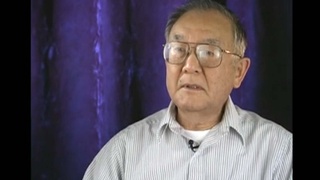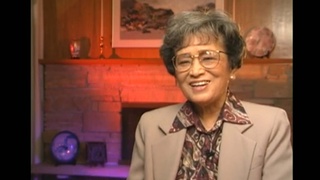Interviews
Citizen participation
There are a lot of countries that call themselves democracies, but the thing that makes the democracy of the United States so distinctive from any other in the country -- in the world, is that it requires citizen participation. And so there were just, I mean, this was really a bottoms-up grassroots effort. Here's something that impacted on 123,000 people back in 1942, out of a population of 200 million people. Who cares? Forget it. But yet this thing kept on bubbling up because working at the grassroots level all across the country. And so there were just a lot of people.
I remember from Seattle, Mrs. Kinoshita, Cherry Kinoshita, being one of those who was always agitating for citizen groups to get involved in this thing. And frankly, there were some of these groups that, who were also lambasting me for taking the legislative approach. Bill Hohri just ripped me a, ripped me a new one, and he thought I was a sellout. Well, he thought my brother-in-law, Mike Masaoka, was a sellout. That he said, he said, "He's the one who put us in camp." Give me a break.
And so, I mean, we were having to swim against the tide, too, within the community. And some of the, frankly, awful things that Bill Hohri said about JACL, Mike Masaoka, George Inagaki, Dr. Tom Yatabe, Mas Sato, all these, and against those of us in the Congress who were pushing the legislative approach, it was not a, it was not a -- even for people like Cherry Kinoshita and people, there was a citizen group in San Jose that was outside some of these other groups, they were having to speak in opposition to what other Nisei groups were doing. But, so it's hard to point out individuals.
Date: July 4, 2008
Location: Colorado, US
Interviewer: Tom Ikeda
Contributed by: Watase Media Arts Center, Japanese American National Museum
Explore More Videos

Growing up with some Japanese families (Spanish)
(b. 1950) Nisei Chilean, Businessman

The various realities of Nikkei in Latin America (Spanish)
(b. 1950) Nisei Chilean, Businessman

The political effects on Nikkei during the war (Spanish)
(b. 1950) Nisei Chilean, Businessman

Relief fund to support Japanese communities (Japanese)
(1900–1996) The mother of Nikkei Brazilian immigration

Role of Assistancia Social dom Jose Gaspar (Japanese)
(1900–1996) The mother of Nikkei Brazilian immigration


Changing Minds
(1923–2006) Community activist. Co-founded the Manzanar Committee

Prevailing Within the System
(1923–2006) Community activist. Co-founded the Manzanar Committee

Fighting For What’s Right
(1923–2006) Community activist. Co-founded the Manzanar Committee

Evolving History
(1929 - 2014) One of the earliest proponents behind the redress movement.

Support from the Japanese American community
(b.1971) Professional figure skater and Olympic gold medalist.

Need for Monetary Compensation
(1923–2008) One of the leaders behind the redress movement.

Erasing the Bitterness
(1923–2008) One of the leaders behind the redress movement.


